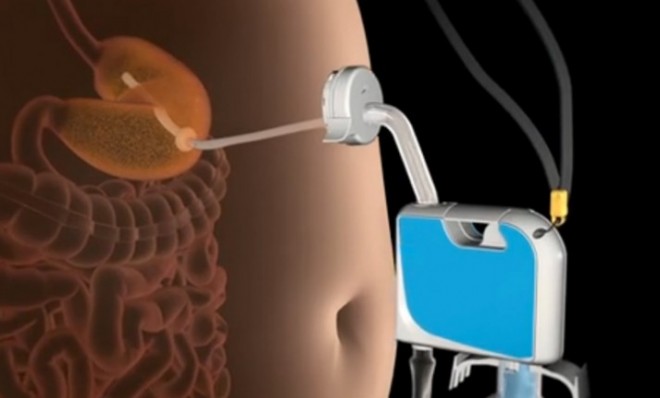The disgusting weight-loss tool that pumps food from your stomach
The inventor of the Segway has come up with a way for people to eat all they want and lose weight, if they can stand the thought of it


People who are slightly overweight may or may not live a bit longer — a controversial debate incited by a recent study — but it's pretty universally understood that being obese is bad. The morbidly overweight, though, have few appealing options: Going on extreme diets and trying to exercise away some extra pounds, a bariatric (gastric bypass) operation or other surgical intervention, or just giving up and living with the health risks, social stigma, and general discomfort. So it's good news, perhaps, that Dean Kamen, inventor of the little used but nonetheless technologically impressive Segway personal transporter, and a group of bariatric physicians have come up with what appears to be a surprisingly effective way of sucking away excess weight. Why only perhaps? Because the AspireAssist personal stomach pump looks stomach-churningly foul.
Here's how it works: Basically, it's a feeding tube in reverse. Instead of pumping life-sustaining nutrients into the stomachs of people unable to eat, the AspireAssist Aspiration Therapy System pumps food out of people who have no problem eating. Patients have a tube inserted into their stomachs then threaded out through an incision in the abdomen and capped with a poker chip–sized "Skin Port" valve. (For more detail, if you so dare, watch the video below.) Twenty minutes after eating breakfast, lunch, and dinner, the patient attaches a handheld device to the Skin Port and empties 30 percent of the contents of his or her stomach into the toilet.
Twenty minutes is enough time for your brain to be convinced that you are full, but not enough time for your stomach to digest the food, the inventors say, and that means 30 percent of the calories from your meal magically disappear. Philadelphia-based Aspire Bariatrics is still trying to get FDA approval to sell the AspireAssist in the U.S., but it has been available in parts of Europe since late 2011.
The Week
Escape your echo chamber. Get the facts behind the news, plus analysis from multiple perspectives.

Sign up for The Week's Free Newsletters
From our morning news briefing to a weekly Good News Newsletter, get the best of The Week delivered directly to your inbox.
From our morning news briefing to a weekly Good News Newsletter, get the best of The Week delivered directly to your inbox.
Reaction to the device has been, well, mixed: In a yearlong U.S. trial of AspireAssist, 24 obese patients lost about half of their excess weight, dropping an average of about 45 pounds. Anecdotal evidence suggests that people are happy with the stomach pump. "This is it for me," 55-year-old Mikael Cederhag of Sweden tells ABC News. After 30 years of "jumping up and down in weight," a year of using the pump rid him of 64 of his original 264 pounds, and counting. "Finally, this is a solution that allows me to get my weight down and stay that way," without permanently changing his body through gastric bypass surgery.
Even Assist Bariatric CEO Katherine Crothall admits that the idea of emptying your stomach is kind of "gross." The good news, though, says Colin Lecher at Popular Science, is that the AspireAssist "could work as a last-ditch effort to get obese people to shed some weight." The bad news? Well, where to start?
How about with a problem that Aspire already knows about: "Initial setbacks — and here's the really yucky part — have occurred because the pump struggles to break up large foods," like cauliflower, steak, pretzels, and Chinese food, says Gillian Orr at Britain's The Independent, so the tube sometimes gets clogged. There are also "significant doubts about the safety of this product," says Dr. Manny Alvarez at Fox News. Draining 30 percent of your stomach is a recipe for dehydration, irritation of the stomach lining, and depriving your organs of a third of "vital electrolytes such as sodium, potassium, and calcium."
"I'm sure it won't be long until tales of infections, leakage, lack of nutrient absorption, depression and suicide, severe hypoglycemia, extreme thiamine deficiency, anemia, osteoporosis, and all sorts of other complications" surface, just like they have with bariatric surgery, says Laura Beck at Jezebel. But this terrifying invention is also, let's face it, an automatic "bulimia machine." The Aspire Assist "is an enabling device, not a helping device," nutritionist Keith Ayoob at Albert Einstein College of Medicine tells ABC News. And as horrifying as it is, "it was only a matter of time before someone came up with" a machine that lets them "just eat and make the calories go away." The only healthy way to lose weight is to change your eating and lifestyle habits, but "once you put this in someone, they're never going to want it taken out."
A free daily email with the biggest news stories of the day – and the best features from TheWeek.com
Hopefully, gradual changes in diet will allow for the pump to be removed at some point, Cederhag tells ABC News, but "if I have to continue to flush my stomach every day or every other day, then so be it." People without weight problems don't understand. "I don't want to be seated at the table with an empty plate. This way I can eat together with my friends and my family, I can drink my beer or wine if I want to. And then I can just let go of 30 percent."
Still, it's hard to escape the unappetizing image of emptying partially masticated food into the toilet three times a day from a cyborg-like valve in your stomach. If that idea, or the video below, makes anyone lose their appetite, maybe there's some weight-loss value in AspireAssist even for those of us who never get near the device.
Peter has worked as a news and culture writer and editor at The Week since the site's launch in 2008. He covers politics, world affairs, religion and cultural currents. His journalism career began as a copy editor at a financial newswire and has included editorial positions at The New York Times Magazine, Facts on File, and Oregon State University.
-
 Political cartoons for December 21
Political cartoons for December 21Cartoons Sunday’s political cartoons include Christmas movies, AI sermons, and more
-
 A luxury walking tour in Western Australia
A luxury walking tour in Western AustraliaThe Week Recommends Walk through an ‘ancient forest’ and listen to the ‘gentle hushing’ of the upper canopy
-
 What Nick Fuentes and the Groypers want
What Nick Fuentes and the Groypers wantThe Explainer White supremacism has a new face in the US: a clean-cut 27-year-old with a vast social media following
